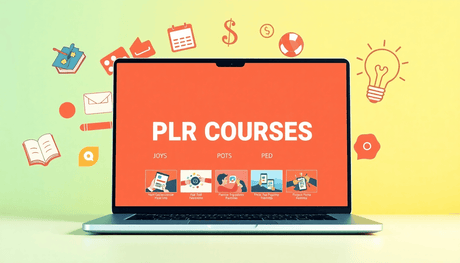The online course market is booming, with unprecedented growth potential. As of late 2023, the industry is projected to reach $319 billion by 2029. This surge has been significantly influenced by the COVID-19 pandemic, which accelerated the demand for flexible learning options.
Key points to consider:
- Increased interest in self-improvement and skill development.
- A shift towards remote learning has expanded the audience for online education.
Selling online courses can be a lucrative business opportunity if done right. With the right strategy and content, you can tap into this thriving market and create a sustainable income stream. Whether you are an entrepreneur, educator, or content creator, there is a niche waiting for your expertise.
For instance, if you have knowledge in areas like emotional intelligence, international negotiation skills, or even Microsoft Excel, you can easily create courses that cater to those needs. Similarly, if programming is your forte, starting a course on Python 3 could attract many aspiring coders.
Moreover, understanding how to effectively utilize affiliate sales funnels can further enhance your online course selling strategy. Embrace this chance to share your knowledge and profit from it.
Understanding the Online Course Market
The online course market is experiencing unprecedented growth, projected to reach $319 billion by 2029. This remarkable figure underscores the increasing demand for digital education and the opportunities available for course creators.
Revenue Potential
Course creators can tap into significant revenue streams, particularly in niche markets such as:
- Entrepreneurship: Courses that teach business skills or startup strategies, including Amazon SEO, Sales & Ads for E-commerce Domination.
- Personal Development: Programs focusing on self-improvement, productivity, or wellness. For instance, a course on getting out of your comfort zone could cater to this audience.
These niches allow you to cater to specific audiences who are willing to invest in their growth, enhancing your earning potential.
Audience Analysis
Understanding your target audience is crucial for maximizing sales. Here are some effective strategies for identifying and targeting your ideal learners:
- Conduct Market Research: Use surveys, social media insights, and forums to gather data on potential learners' needs and preferences.
- Analyze Competitors: Study successful courses in your niche. Identify their strengths and weaknesses to refine your offerings.
- Create Buyer Personas: Develop detailed profiles of your ideal students, including demographics, interests, and pain points.
By focusing on these aspects, you can tailor your content and marketing strategies to resonate with the right audience. This targeted approach not only improves engagement but also drives higher conversion rates as you build a loyal customer base in the expanding online course landscape.
Leveraging Technology
In addition to understanding your audience and refining your course offerings, leveraging technology can greatly enhance your online course's reach and effectiveness. For example, utilizing web development tools can help create a more user-friendly website that improves learner experience. Furthermore, mastering tools like Google Apps Script IDE can streamline administrative tasks associated with running an online course.
Also, implementing effective marketing strategies such as using Hellobar for email subscribers in MailChimp can significantly increase your email list and enhance communication with potential learners.
The Benefits of Selling Online Courses
Selling online courses offers numerous advantages that can transform your financial landscape. Here are the primary benefits:
1. Passive Income
Once you create a course, it can generate revenue with minimal ongoing effort. Course content remains available for purchase, allowing you to earn money while you focus on other projects or personal pursuits. This passive income stream is particularly appealing for those seeking financial stability without continuous active work. You could even explore options such as affiliate marketing, which can further enhance your passive income potential.
2. Flexibility
As a course creator, you have the freedom to work from anywhere at any time. Whether you prefer a home office or a beachside café, your location does not limit your ability to create and sell courses. You set your own working hours, enabling a balance between professional and personal life that many traditional jobs do not offer. If you're unsure about creating video content, there are ways to sell video courses without filming.
3. Scalability
Online courses can easily be scaled to reach a larger audience without significant additional costs. Unlike physical products that require inventory and shipping, digital courses can be sold to thousands of students simultaneously. This scalability empowers you to grow your business exponentially while maintaining low overhead costs. Moreover, with the right strategies, such as leveraging ethical hacking courses or auditing and assurance courses, you can diversify your offerings and tap into lucrative markets.
By embracing these benefits, you position yourself to build a successful online education venture that aligns with your lifestyle and financial goals.
Choosing the Right Course Content
Selecting the right course content is crucial for your success in selling online courses. Here are key considerations:
1. Identifying a Profitable Niche
Focus on areas that align with your expertise and have a proven demand. Research trends using tools like Google Trends or industry reports. Consider niches such as entrepreneurship, personal development, or specialized skills that cater to a specific audience. Understanding market needs enables you to create courses that attract eager learners.
2. Creating Quality Content
Engaging and valuable course materials are vital to retain students and enhance their learning experience. Utilize various formats such as videos, quizzes, and interactive assignments to cater to different learning styles. Incorporate visuals and real-life examples to make complex concepts more digestible. Aim for high production quality, as this reflects your commitment to delivering value.
For instance, if you decide to create a course on Conflict Management Skills for Leaders, remember that engaging content will significantly enhance the learning experience.
3. Setting Clear Learning Outcomes
Establish specific objectives for what students will achieve upon completion of your course. Clear learning outcomes not only guide course structure but also help students understand the benefits they will gain. For instance, if you’re teaching digital marketing, specify that students will be able to create their own campaign by the end of the course.
Another example could be a Metaverse Master Class, where clear outcomes such as understanding the Metaverse concept and its applications can greatly benefit your students.
By focusing on these elements, you position yourself effectively in "The Easiest Way to Make Money Selling Online Courses." This foundation ensures that your offerings stand out in a competitive market and appeal directly to those seeking meaningful education.
Structuring Your Online Course Effectively
Creating a successful online course involves more than just having great content. It's about creating an effective course structure, which is crucial for keeping learners engaged and ensuring they achieve their learning objectives. Here are some key elements to consider:
1. Modules
Break your course into manageable modules that cover specific topics or themes. This helps learners digest information in chunks and makes the course feel less overwhelming.
2. Lessons
Each module should contain several lessons that delve deeper into the subject matter. Aim for a mix of formats, such as video lectures, written content, and interactive quizzes to cater to different learning styles.
3. Assessments
Incorporate assessments at the end of each module. Quizzes or assignments reinforce learning and provide feedback on comprehension, keeping students motivated and on track.
When it comes to hosting platforms, choosing the right one can significantly influence your course's success. Here’s a brief overview of popular options:
-
Udemy: Large audience reach, built-in marketing tools, user-friendly interface.
-
Thinkific: Customizable branding, no transaction fees on sales, robust analytics.
-
Pros: High competition, Udemy takes a percentage of your sales.
-
Cons: Requires more setup time, may have a steeper learning curve for beginners.
Additionally, leveraging offline marketing strategies can help promote your online courses effectively. Selecting a platform that aligns with your needs is essential for effective content delivery. Spend time researching these options to find the best fit for your course goals and audience preferences.
Moreover, incorporating elements from other fields such as Results-Based Management can enhance your course's effectiveness by providing strategies for performance and accountability.
If you're considering adding a technical aspect to your course, exploring subjects like Internet of Things Hacking or Dynamic JavaScript WebPages could provide valuable content for your learners.
For those looking to create and sell profitable online courses, following these 9 steps could be beneficial.
Marketing Strategies for Selling Courses Online
Building a successful online course goes beyond creating quality content. Effective digital marketing strategies for online courses, such as creating a winning marketing plan, play a crucial role in attracting students and driving sales.
Create an Engaging Website
Your website serves as the central hub for your courses. Focus on these key elements:
- Showcase Your Expertise: Highlight your background, qualifications, and what makes you an authority in your niche.
- Promote Courses Effectively: Use clear calls-to-action (CTAs) to guide visitors toward enrolling in your courses.
If you're unsure how to set up an effective website, consider exploring resources like this guide on getting started with Google Sites, which offers easy website setup options.
Utilize Social Media Platforms
Platforms like Instagram and YouTube are invaluable tools for reaching potential students. Consider these tactics:
- Targeted Ads: Invest in advertising campaigns to reach specific demographics interested in your course topics.
- Valuable Content Creation: Share free tips, tutorials, or sneak peeks of your course content to engage users and build interest.
Build a Community Around Your Brand
Creating a sense of community can significantly enhance student loyalty and engagement. Strategies to consider include:
- Email Newsletters: Regularly update subscribers with valuable insights, course launches, or industry news.
- Exclusive Facebook Groups: Foster interaction among students by providing a space for discussions, support, and networking.
Engaging potential students through these marketing strategies not only enhances visibility but also establishes trust and credibility in your brand. By effectively showcasing your expertise and creating connections, you position yourself as a go-to resource in the online education landscape.
Overcoming Challenges in Course Selling
Selling online courses presents unique challenges. Notably, visibility in a saturated market can hinder your success. Many course creators struggle to stand out against established instructors with larger followings. To navigate this, consider these strategies:
- Identify Your Unique Selling Proposition (USP): Define what sets your course apart. This could be your teaching style, niche focus, or exclusive content.
- Leverage Customer Acquisition Strategies: Use targeted advertising on platforms like Facebook and Instagram to reach your ideal audience. Investing in SEO can enhance organic reach.
- Build a Strong Personal Brand: Establish yourself as an authority in your niche through consistent content creation and engagement with your audience.
High competition can also lead to discouragement. Focus on providing real value through high-quality materials and exceptional support for learners. By addressing these challenges head-on, you position yourself for success in the competitive landscape of online education.
Success Stories from Top Course Creators
Many successful course creators have built profitable businesses by sharing their expertise. Here are a few inspiring case studies of successful course sellers:
1. Pat Flynn
Known for his Smart Passive Income brand, Pat launched online courses that focus on entrepreneurship and business strategies. His transparent approach to income reporting helped him build trust and a loyal following.
Key takeaway: Authenticity can significantly enhance your credibility.
2. Marie Forleo
With her B-School program, Marie has empowered countless entrepreneurs to grow their businesses online. Her courses emphasize actionable strategies combined with mindset coaching.
Key takeaway: Combining practical skills with personal development can deepen the value of your course.
3. Angela Lee Duckworth
Creator of the popular course on grit and resilience, Angela's unique insights have resonated widely. Her research-based content taps into a growing demand for personal development.
Key takeaway: Leveraging academic expertise can differentiate your offerings in a crowded market.
These examples highlight that success in selling online courses often hinges on:
- Understanding your audience
- Offering valuable content
- Building a strong community around your brand
The Easiest Way to Make Money Selling Online Courses involves learning from those who have paved the way and applying their insights to your own journey.
FAQs (Frequently Asked Questions)
What is the current growth potential of the online course market?
The online course market is projected to grow to $319 billion by 2029, showcasing significant revenue potential for course creators, especially in niche areas like entrepreneurship and personal development.
How has COVID-19 impacted the demand for online education?
COVID-19 has accelerated the demand for online education, leading to an increased interest in selling online courses as more people seek flexible and accessible learning options.
What are the benefits of selling online courses?
Selling online courses can provide passive income streams, flexibility in working hours and location, and scalability to reach a larger audience without significant additional costs.
How do I choose profitable content for my online course?
To choose profitable content, select a niche that aligns with your expertise and has high market demand. Focus on creating high-quality materials that engage learners and set clear learning outcomes for student satisfaction.
What are effective marketing strategies for selling online courses?
Effective marketing strategies include building an engaging website to showcase your expertise, utilizing social media platforms like Instagram or YouTube for targeted advertising, and fostering a community around your brand through email newsletters or exclusive groups.
What challenges might I face when selling courses online?
Common challenges include low visibility in a saturated market and competition from established instructors. Overcoming these challenges requires effective customer acquisition strategies and building a strong brand presence.









